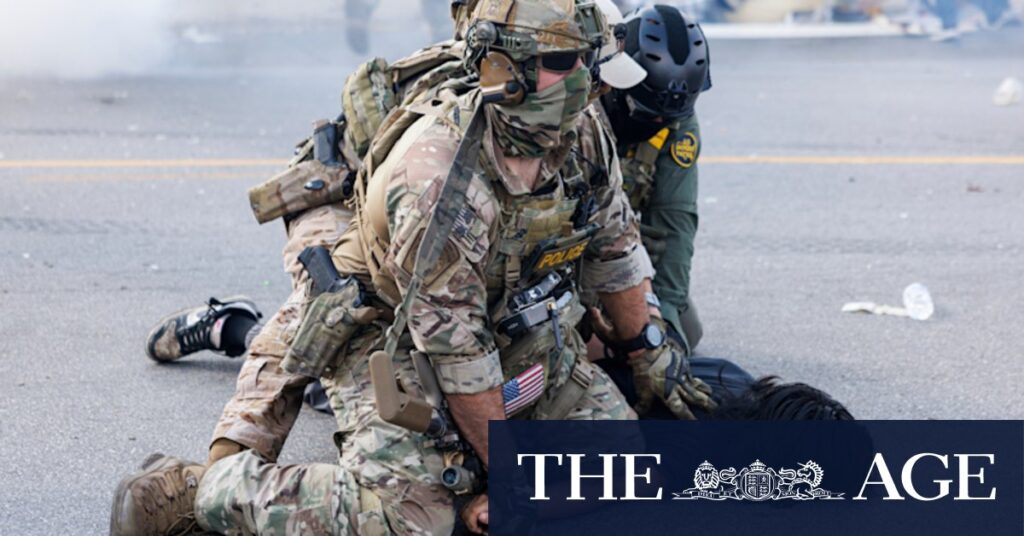
US President Donald Trump has authorized the deployment of 300 Illinois National Guard troops to safeguard federal officers and assets in Chicago amid ongoing protests. This marks the latest escalation in his use of federal intervention in American cities. Meanwhile, a similar mobilization in Oregon was temporarily blocked by a federal judge, raising questions about the legality of such actions.
White House spokeswoman Abigail Jackson confirmed the deployment, citing “ongoing violent riots and lawlessness” that local leaders have failed to control. The Department of Homeland Security reported that federal agents shot a woman in Chicago after they were allegedly ambushed by “domestic terrorists.” The woman, Marimar Martinez, was reportedly armed and involved in the incident, leading to her arrest by the FBI.
Federal Intervention Sparks Controversy
Trump has depicted cities like Portland and Chicago as hotbeds of crime and unrest, using these characterizations to justify federal interventions. Since the start of his second term, he has considered or initiated troop deployments in ten cities, including Baltimore, Memphis, and several Californian cities. However, the governors of Illinois and Oregon have voiced strong opposition to these actions.
Illinois Governor J. B. Pritzker described the federal demands as “outrageous and un-American,” emphasizing the state’s sovereignty over its internal affairs. The situation in Chicago has been tense, with frequent rallies near immigration facilities and arrests of protesters, raising concerns about racial profiling and civil liberties.
Portland’s Legal Battle
In Portland, Oregon, Trump’s portrayal of the city as “war-ravaged” has been contested by local officials, who argue that his claims are based on outdated images from 2020. Oregon Governor Tina Kotek refused to deploy state troops, prompting Trump to issue an order through Defense Secretary Pete Hegseth. This led to a lawsuit from city and state officials.
US District Court Judge Karin J. Immergut temporarily blocked the deployment, citing the protests’ relatively small scale and the potential harm to Oregon’s state sovereignty. She emphasized the nation’s tradition of resisting government overreach, particularly military intrusion into civil matters.
“This country has a long-standing and foundational tradition of resistance to government overreach, especially in the form of military intrusion into civil affairs,” Judge Immergut wrote.
Broader Implications and Reactions
The deployment of federal troops in cities like Memphis and New Orleans has been met with mixed reactions. While some state governors have welcomed the federal presence, others, like California’s Governor Gavin Newsom, have successfully challenged the legality of such actions in court.
Experts argue that these interventions could set a precedent for federal overreach, potentially undermining state authority. The sight of heavily armed federal agents in urban areas has also sparked debates about civil liberties and the militarization of law enforcement.
Historical Context and Future Outlook
Historically, the use of federal troops in domestic affairs has been a contentious issue. The Posse Comitatus Act, enacted in 1878, limits the federal government’s ability to use military forces for law enforcement. Critics of Trump’s actions argue that these deployments may violate this principle, leading to legal challenges and public outcry.
As the situation unfolds, the balance between federal authority and state sovereignty remains a critical issue. The outcomes of ongoing legal battles could have significant implications for future federal interventions in domestic affairs.
By the Numbers: Since the start of his second term, Trump has considered or initiated troop deployments in 10 cities across the United States.
The next steps will likely involve continued legal challenges and public debate over the role of federal forces in managing civil unrest. As cities grapple with protests and calls for reform, the tension between federal and state governments is expected to persist.







